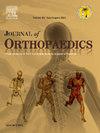Use of augmented reality surgical navigation reduces intraoperative fluoroscopic imaging in anterior total hip arthroplasty with equivalent accuracy for component positioning
IF 1.5
Q3 ORTHOPEDICS
引用次数: 0
Abstract
Background
Computer-assisted surgical navigation was designed to reduce the rates of acetabular component malpositioning, a common cause for revision following primary total hip arthroplasty (THA). We compared intraoperative measures such as radiation exposure, radiographic acetabular cup placement, and outcomes of patients who underwent a THA using computer-assisted surgical navigation with augmented reality (AR) compared to those who underwent traditional manual THA with fluoroscopic assistance (FA).
Methods
We retrospectively reviewed 115 hips who underwent primary direct anterior THAs using the intraoperative AR surgical navigation system between 3/30/2021 and 12/30/2022. These were compared to a matched cohort of 115 primary THAs performed with FA through a direct anterior approach during the same time period. Patients were matched based on age, gender, American Society of Anesthesiologists score (ASA), and BMI. Goal inclination and anteversion were set to 42° (°) and 22°, respectively.
Results
THA with AR patients had decreased intraoperative radiation exposure (mean 2.0 versus 3.2 mGy, p < 0.001) and radiation time (mean 0.2 versus 0.4 min, p < 0.001). Deviation from the preoperative plan was similar between AR and FA for both radiographic inclination and anteversion. There was no difference in the operative time, estimated blood loss, or reoperations, all of which were for infection (1.7 versus 0.0 %, p = 0.5).
Conclusion
AR surgical navigation in primary THA has similar radiographic, operative and clinical results as THA with intraoperative FA. However, AR surgical navigation is associated with decreased intraoperative fluoroscopic radiation and time. Further research is needed to evaluate accuracy of acetabular component positioning and complications.
增强现实手术导航的使用减少了前路全髋关节置换术中的术中透视成像,具有相同的部件定位精度
背景计算机辅助手术导航旨在降低髋臼组件错位率,这是初级全髋关节置换术(THA)后翻修的常见原因。我们比较了使用计算机辅助手术导航和增强现实技术(AR)进行全髋关节置换术的患者与使用透视辅助技术(FA)进行传统人工全髋关节置换术的患者的术中辐射暴露、髋臼杯置入放射影像学检查和治疗效果等指标。方法我们回顾性研究了在 2021 年 3 月 30 日至 2022 年 12 月 30 日期间使用术中 AR 手术导航系统进行初级直接前路全髋关节置换术的 115 例髋关节患者。我们将这些患者与同期通过直接前方入路使用FA进行的115例初级THA进行了比较。患者根据年龄、性别、美国麻醉医师协会评分 (ASA) 和体重指数进行匹配。结果使用 AR 的患者术中辐射量(平均 2.0 对 3.2 mGy,p < 0.001)和辐射时间(平均 0.2 对 0.4 分钟,p < 0.001)均有所减少。AR 和 FA 在影像学倾斜度和前倾角方面与术前计划的偏差相似。在手术时间、估计失血量或再次手术方面没有差异,所有再次手术都是因为感染(1.7% 对 0.0%,P = 0.5)。然而,AR手术导航可减少术中透视辐射和时间。需要进一步研究评估髋臼组件定位的准确性和并发症。
本文章由计算机程序翻译,如有差异,请以英文原文为准。
求助全文
约1分钟内获得全文
求助全文
来源期刊

Journal of orthopaedics
ORTHOPEDICS-
CiteScore
3.50
自引率
6.70%
发文量
202
审稿时长
56 days
期刊介绍:
Journal of Orthopaedics aims to be a leading journal in orthopaedics and contribute towards the improvement of quality of orthopedic health care. The journal publishes original research work and review articles related to different aspects of orthopaedics including Arthroplasty, Arthroscopy, Sports Medicine, Trauma, Spine and Spinal deformities, Pediatric orthopaedics, limb reconstruction procedures, hand surgery, and orthopaedic oncology. It also publishes articles on continuing education, health-related information, case reports and letters to the editor. It is requested to note that the journal has an international readership and all submissions should be aimed at specifying something about the setting in which the work was conducted. Authors must also provide any specific reasons for the research and also provide an elaborate description of the results.
 求助内容:
求助内容: 应助结果提醒方式:
应助结果提醒方式:


